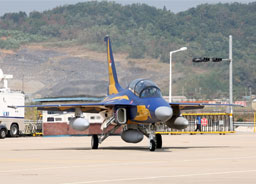Wednesday 28 October 2015
US Vetoes the Export of T-50 Korean Fighter to Uzbekistan
Keywords:
SEOUL (Korea Times) — The U.S. government has rejected to let Korea to export $400 mln worth of indigenous supersonic training jets to Uzbekistan, sources said Sunday. Korea Aerospace Industries’ (KAI) T-50 Golden Eagle was co-developed in 2006 with Lockheed Martin, using the U.S. firm’s core technologies, including the avionics system and engine.

- T-50I Indonesian Air Force version
KAI seeks to sell 12 T-50s worth $400 mln (454 bln Korean won).
The refusal of permission is another blow to Korea’s program to develop its own military aircraft and comes at a sensitive time when the U.S. government’s rejection to hand over key avionics technologies regarding F-35 fighters to Korea has become a political issue between the two countries. The Korea’s weapons procurement agency has drawn fire for failing to receive key avionics technologies from its purchase of 40 F-35 stealth jets as an offset package.
“KAI has been in negotiations with the Uzbek government to export the supersonic trainers, but the U.S. government is opposing the deal, citing possible technology leakage and diplomatic policy”, a source said. Korea using American technologies in its fighter, it needs to get approval from the U.S. government to export the aircraft in accordance with the U.S. Arms Export Control Act.
In addition, the U.S. also expressed concerns that Uzbekistan’s procurement of the T-50s may increase tensions with neighbouring countries, the source said.
The military believes that the U.S. opposition is due to Uzbekistan’s membership of the Shanghai Cooperation Organization (SCO) that some say has emerged as an anti-U.S. bulwark in Central Asia. The SCO’s other members are China, Kazakhstan, Kyrgyzstan, Russia and Tajikistan. “As Uzbekistan has close ties with Russia, the U.S. is worried that an export of T-50s to Uzbekistan may lead to its technologies being transferred to Russia”, said a military official.
President Park Geun-hye and Uzbek President Islam Karimov reportedly discussed the issue during their summit at Cheong Wa Dae in May.
In April, Defense Minister Han Min-koo and his Uzbek counterpart Kabul Berdiev signed the memorandum of understanding on promoting bilateral partnerships and Berdiev piloted the FA-50 simulator. The FA-50 is a light attack variant of the T-50 that has been exported to Iraq, the Philippines and Thailand. KAI also exported 16 TA-50s, another T-50 variant, to Indonesia.
However, the Defence Acquisition Program Administration (DAPA), the nation’s arms procurement agency, is still seeking to keep the talks with Uzbekistan alive. “Despite the U.S. opposition, DAPA will step up efforts to persuade Washington to approve the deal”, the military official said.
The T-50 is South Korea’s first indigenous supersonic aircraft and one of the world’s few supersonic trainers. Development began in the late 1990s, and its maiden flight occurred in 2002. The aircraft entered active service with the Republic of Korea Air Force (ROKAF) in 2005. The T-50 has been further developed into aerobatic and combat variants, namely T-50B, TA-50, and FA-50. The F-50 is another advanced fighter variant being considered. The T-50B serves with the South Korean air force’s aerobatics team. The TA-50 light attack variant has been ordered by Indonesia. The Philippines ordered 12 units of the FA-50 variant. The T-50 is also being marketed as a candidate for the United States Air Force’s next-generation T-X trainer programme. Thailand ordered 4 units of the T-50 advanced trainer variant.

